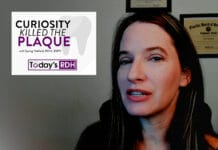Tooth brushing, eating habits, and overall health-enhancing behaviors are formed early in life. In childhood, parents and the extended family or community teach and coach body health techniques while consciously or subconsciously passing on what they themselves have learned.
Adults, for example, might be aware of the negative effects of fast food, but they still intuitively pull over at a fast-food joint, recalling special occasions as a child. The positive imprint in the brain might be formed when caretakers used fast food as gratification. This can be a problem in adulthood as fast food is unhealthy nourishment, but also linked to positive childhood memories and raised serotonin levels.
The same is true for dental hygiene. I believe it’s time to further evangelize and inspire a shift in practice from shaming to encouraging and mentoring patients.
The Guilt Trip
Dental professionals can often act in the role of judgmental parents, inquiring about dental health routines in a guilt-inflicting tone: “Did you actually perform your flossing and tooth brushing routine?” They may even confront patients, implying or accusing them of lying.
Even if the dental professional is right, does it help to make the patient feel guilty? Professionals forget that patients don’t always know what comprises a healthy mouth. We then become judgmental as if the patient is deliberately being “difficult.”
Mentor, Not Remand
In many online forums, dental professionals furiously attack or criticize their patients while engaging in groupthink rants. Our peers are cursed with their own knowledge of how to prevent oral disease and properly care for the mouth, forgetting that patients are not full of the same knowledge that dental professionals have.
The “curse of knowledge” as discussed in Made to Stick by Chip and Dan Heath explains that, when you know something in-depth (such like oral health and how to achieve it), it becomes difficult to recall what it is like not to know that information.
Take toothbrushing habits, for example. Professionals are often seen shaming patients in forums and asking if they put the correct side of the toothbrush in their mouth. Instead, that time spent shaming could be spent having the patient show the professional their toothbrush technique. We, the dental professional, know how to brush, but toothbrushing habits can be difficult to change, especially if those habits were created at a young age. It is important to mentor, guide, and coach instead of jumping to conclusions and shaming the patient while in the chair or any other time.
In fact, I was impacted directly by “the curse of knowledge” but as a patient and not as a clinician. I recently underwent emergency surgery due to a birth defect I was unaware of. My colon flipped, and I was rushed into surgery where they removed a large portion of my colon, my appendix, and reattached my small intestines. This was a surgery I was not prepared for. I woke up from anesthesia with the sad news that I was stuck in the hospital for a while and that was about all the information I received.
My surgeon did not warn me about the therapy I would need to heal, the way I would now digest food, or that my mental health would take such a hit after major gut surgery. My surgeon was cursed with his knowledge and could not understand my lack of knowledge in the situation. If I had not been my own advocate, asking a relentless amount of questions, and doing my own research, I would have been truly lost as a patient. Like my surgeon, we are all guilty of forgetting what it is like to be the patient.
So, the bitter truth is that many dental health professionals are missing out: Being right about the patient’s inability to routinize healthy behaviors or venting on social media forums does not help. Mentoring is a necessary skill in dental health care: For example, the National Health Service in the United Kingdom hosts an educational website known as “Making Every Contact Count.” The objective is to encourage “positive changes to their [patients’] physical and mental health and wellbeing” in a mentoring capacity. The programs enable the “opportunistic delivery of consistent and concise healthy lifestyle information” and “enables individuals to engage in conversations about their health at scale across organizations and populations.”
As one in the position of authority for dental self-care, professionals might want to be especially aware of psychological stresses patients are going through: Even a routine visit is a big step for many. What does the patient know about dental health routines? What is the knowledge the patient needs at this stage? How do professionals raise awareness and leave their patients motivated and encouraged to form better habits?
The ability to change behavior is influenced by individual, social, and environmental factors as well as socioeconomic circumstances. Studies show that to maintain and adopt beneficial health behaviors is really difficult. First, patients need to form the actual intention, which starts with understanding why adopting better habits in dental self-care is essential. Even after forming a behavioral intention, one needs self-regulatory skills such as planning and action control to translate the intention into actual health-enhancing behaviors.
Inspired Knowledge
With a positive spirit, professionals together with their dental teams can recommend the best ways to keep teeth, gingiva, and mouth hygiene healthy, including long-term mentoring that helps to educate and increase awareness. This can have so many positive effects on the patient’s lives, and even create lasting change in the population at large. It also makes a professional’s job more exciting, working on the bigger picture, and openly discussing topics like why and how to brush, clean between the teeth, and why visiting the dentist is much more than a “cleaning.” These topics are not as widespread, or as mainstream a knowledge, as professionals like to assume.
When we partake in these online forums where we “vent,” we breed frustration, anger, and animosity toward our patients, colleagues, and our profession as a whole. There are many podcasts, blogs, and social media that can be recommended or used as a base for better mentoring. Oral hygiene coaches and mentors who understand the urgency and lack of inspired knowledge sharing use these information channels to educate on a variety of techniques in fun ways. We believe that everyone deserves a mouth free of disease, pain, and good overall oral health. Our hope is to inspire change in the industry by replacing patient shaming with platforms where health-enhancing behavior and knowledge are shared openly.
Now Listen to the Today’s RDH Dental Hygiene Podcast Below:
References
- Aunger, R. Tooth brushing as routine behavior. International Dental Journal. 2010 Dec; 57(S5: 364-379. Retrieved from https://onlinelibrary.wiley.com/doi/abs/10.1111/j.1875-595X.2007.tb00163.x
- Claessen, J., Bates, S., Sherlock, K., et al. Designing interventions to improve tooth brushing. International Dental Journal. 2008 Oct; 58. Retrieved from https://www.researchgate.net/publication/228814688_Designing_interventions_to_improve_tooth_brushing
- Duxbury, J.T., Catleugh, M.A., Davies, R.M., et al. Delivering better oral health: an evidence-based toolkit for prevention. Public Health England Department of Health. 2017 Mar; 3. Retrieved from https://assets.publishing.service.gov.uk/government/uploads/system/uploads/attachment_data/file/605266/Delivering_better_oral_health.pdf
- Kelly, M.P., Barker, M. Why is changing health-related behaviour so difficult?” Public Health. 2016 Jul; 136:109-116. Retrieved from https://www.ncbi.nlm.nih.gov/pmc/articles/PMC4931896/
- Making Every Contact Count. NHS: Health Education England. Retrieved from https://www.makingeverycontactcount.com/












